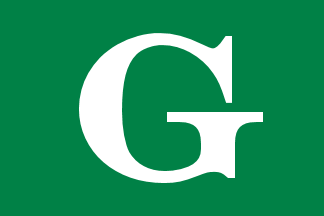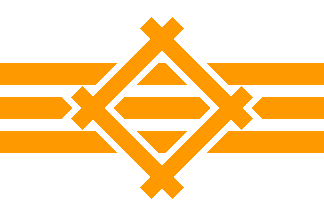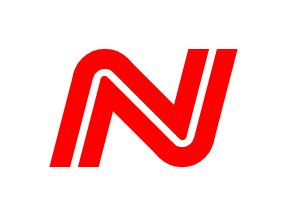![[Mitsui O.S.K. Lines]](../images/j/jp~mol3.gif) image by Eugene Ipavec, 29 April 2009
image by Eugene Ipavec, 29 April 2009Source Mikami Flags

Last modified: 2015-08-28 by zoltán horváth
Keywords: maritime shipping | mitsui osk lines | inui kisen | itaya shosen | kotani kisen | meiji kaiun | mitui senpaku | osaka shosen kaisha | tamai shosen | kanji: o | mitsui kinkai | sanwa maring | green kaiji kaisha |
Links: FOTW homepage |
search |
disclaimer and copyright |
write us |
mirrors
Current Logo
![[Mitsui O.S.K. Lines]](../images/j/jp~mol3.gif) image by Eugene Ipavec, 29 April 2009
image by Eugene Ipavec, 29 April 2009
Source Mikami Flags
Shown on Mikami Flags site (image no longer available) is well worth a was MOL’s house or group flag.
On a white field with blue logo i.e. serifed initials ‘MOL’ encased in blue and white joined rectangles, counterchanged: ‘M’ and ‘L’ are white, ‘O’ blue.
In a press release dated 22 March 2007: ‘MOL Introduces New Group Logo Mark’
TOKYO - Mitsui O.S.K. Lines, Ltd. (MOL, President: Akimitsu Ashida) today introduced its new Group logo mark. MOL, aiming at the long-term vision "To make the MOL Group an excellent and resilient organization that leads the world shipping industry," will use this new logo mark all over the world beginning on April 1.
The new logo mark is the acronym of Mitsui O.S.K. Lines, and uses the three letters M (em). O (o). L (el), which have been familiar for a long time, as the motif. The deep blue symbolizes the sea.
The start page of MOL website featured the logo followed by quote from the ‘History’ page:
1964 - Japan's shipping industry undergoes a major consolidation, with mergers creating six companies -- Mitsui O.S.K. Lines, Ltd. (MOL) by a merger of OSK Lines and Mitsui Steamship, Japan Line, Ltd. (JL) by a merger of Nitto Shosen and Daido Kaiun, and Yamashita-Shinnihon Steamship Co., Ltd. (YSL) by a merger of Yamashita Kisen and Shinnihon Kisen.
Jan Mertens, 21 November 2008
This is Mitsui Osaka Shosen Kaisha, described in "All about Ships & Shipping"
(1959) as "White with Red Charges". Accordingly this would be: "three horizontal
bands white -red- white, proportioned (approximately) 2:3:2; the red band with
white charges."
Jarig Bakker, 22 October 2003
Founded 1884, as Osaka Shosen Kaisha (O.S.K. Line) is founded. In 1964, Japan's shipping industry undergoes a major consolidation, creating Mitsui O.S.K. Lines, Ltd. (MOL) through mergers.
The company resulted from the merger of Osaka Shosen Kaisha and
Mitsui Senpaku K.K. being generally known by the English
version of Mitsui O.S.K. Lines Ltd., the Japanese version reversing the name order
as Osaka Shosen Mitsui Senpaku Kabushiki Kaisha. The flag incorporates features
from both companies with the 3 red bands representing the Kanji and Katakana meaning
"Mi" or "Mitsu" which translates as "3", and the white "squashed x" symbol the
Kanji "O".
Neale Rosanoski, 3 January 2004
![[Asahi Tanker Co]](../images/j/jp~asahi.gif) image by Ivan Sache, 12 April 2007
image by Ivan Sache, 12 April 2007
This is one of the many Japanese shipping companies using a red-and-white house flag, founded in 1951, and having its headquarters in Tokyo.
Homepage (English version): http://www.asahi-tanker.com/en/index.html
Operating 120 ships one of which is the largest Japanese tanker, the firm is active on the domestic market carrying oil, asphalt, LPG, etc. On the international side, three branch offices in East Asia and one in London direct 20 tankers. In addition, four companies owned by Asahi Tanker are active in shipping management.
Some vessels are owned but mostly chartered; considered part of the fleet are ships of affiliated companies Kyokuyo Tanker Co. Ltd and Kyuseki Marine Co. Ltd.
The house flag is red bearing a very large white initial ‘A’, serifed; a thin
white horizontal edge is at the top of the flag but a similar one at the bottom
is interrupted below the initial.
Jan Mertens, 7 April 2007
Asahi literally means "Morning Sun".
Jonathan Dixon, 13 April 2007
 image by Eugene Ipavec, 6 December 2007
image by Eugene Ipavec, 6 December 2007
One of the many members of the MOL or Mitsui shipping group of Japan, Green Kaiji Kaisha Ltd has held a Green Management Certification since 2006.
Its webpage (in Japanese) presents the consolidated subsidiary.
Apparently founded in 1969, Green Kaiji Kaisha is a domestic tugboat operator
(possibly Nagoya).
Jan Mertens, 5 December 2007
Another member of the vast Mitsui group, this Tokyo based Japanese firm maintains a modest web presence (Japanese version of site) showing white flagoid bearing a very large blue disk with a white initial "M", in script.
I understand this firm was founded in 1937 and specializes in crewing, originating as a Baba(?) Steamship subsidiary. Merging with Taiko in 1966 to become Baba Taiko, the current name was adopted in 1989.
According to Wikipedia,
Mitsui OSK Lines owns 58% of IMT.
Jan Mertens, 18 December 2007
![[Inui Kisen K.K.]](../images/j/jp~s0868.gif) image by Phil Nelson
image by Phil Nelson
Source: Flags, Funnels and Hull Colours, 1963
[ste63]
Inui Kisen K.K. still trades under its own name as
a subsidiary of Mitsui O.S.K. Lines Ltd.
Neale Rosanoski, 5 March 2003
![[Itaya Shosen K.K]](../images/j/jp~s0298.gif) image by Phil Nelson
image by Phil Nelson
Source: Flags, Funnels and Hull Colours, 1963
[ste63]
Itaya Shosen K.K. was formed 1903 and still operates
as a subsidiary of Mitsui OSK Lines.
Neale Rosanoski, 5 March 2003
![[Kotani Kisen K.K.]](../images/j/jp~s0415.gif) image by Phil Nelson
image by Phil Nelson
Source: Flags, Funnels and Hull Colours, 1963
[ste63]
By 1970 Kotani Kisen K.K. appears to have become
Osaka Senpaku K.K. and going by their funnel markings the flag was retained although
it may now be no longer used as the company is now part of Mitsui
OSK Lines Ltd.
Neale Rosanoski, 5 March 2003
![[Meiji Kaiun K.K.]](../images/j/jp~s0100.gif) image by Phil Nelson
image by Phil Nelson
Source: Flags, Funnels and Hull Colours, 1963
[ste63]
Meiji Kaiun K.K. was formed 1911 but appears to have
not quite made the end of last century after becoming part of the
Mitsui OSK group.
Neale Rosanoski, 5 March 2003
 image by António Martins-Tuválkin, 16 September 2007
image by António Martins-Tuválkin, 16 September 2007
A member of the Mitsui (MOL) Group, Tokyo-based Mitsui Kinkai Kisen Co., Ltd maintains a modest website (mostly in Japanese).
The company seems to have been founded in 1943 and engages in ship management.
Internationally active, Mitsui KK "has crew training centers in Qindao, China, and in Manila to train international licensed seafarers" as stated on the "News Radar" page.
A MOL Group restructuring designated six companies to "manage an appropriate number of vessels to ensure thorough on-site supervision" (2006) of which Mitsui KK was one.
The house flag is shown at the company homepage - as a drawing - and seems related to Mitsui Senpaku’s ("three wells").
However the three short bars are lengthened in the case of Mitsui KK; remarkable
is the orangey colour on white.
Jan Mertens, 30 August 2007
A white flag, approximately 2:3, with three narrow horzontal orange stripes and over all an orange large tilted octothorpe fimbriated white.
The mentioned Japanese word for "well" is "井" in hanzi, "い" in hiragana and "i" in romaji.
António Martins-Tuválkin, 16 September 2007From the The National Maritime Museum:
The house flag of Mitsui Senpaku K. K., Tokyo. A white flag with a red motif. The flag is made of a wool and synthetic fibre bunting. It has a cotton hoist and is machine sewn. The design is printed. A rope and two Inglefield clips is attached attached. The logo refers to the company name which means three ships.Jarig Bakker, 20 August 2004
There are three bars (mitsu = 3) inside a square, a stylized version of
a kanji meaning "well" (as in water, read "i".) Mitsui is a common surname
having nothing to do with ships. Thus the name "Mitsui" could be translated
as "three wells".
Albert S. Kirsch, 20 August 2004
Mitsui Senpaku K.K. originated 1876 as Mitsui Bussan Kaisha involved the
carriage of coal. In 1942 the shipping division became independent as Mitsui
Senpaku K.K.and then in the 1964 merges it combined into Osaka Shosen Mitsui
Senpaku K.K. which is more usually known as Mitsui OSK Lines
Ltd.
Neale Rosanoski, 5 March 2003
 image by Eugene Ipavec, 30 November 2007
image by Eugene Ipavec, 30 November 2007
Part of the large MOL (Mitsui OSK Lines) Group - a consolidated subsidiary - Nihon Tug-Boat Co., Ltd is given a modest page (Japanese).
The company seems to have been founded in 1967, having its head office in Kobe. A flagoid is shown, painted on the side of a tug, here (first photo).
![[Osaka Shosen Kaisha]](../images/j/jp~s0386.gif) image by Phil Nelson
image by Phil Nelson
Source: Flags, Funnels and Hull Colours, 1963
[ste63]
Osaka Shosen Kaisha. Some sources incorrectly
give a blue field to the flag prior to the 1930s but it has always been white
as shown. Dating from 1884 it formed part of the 1964 merging resulting in
Mitsui O.S.K. Lines.
Neale Rosanoski, 5 March 2003
![[Tamai Shosen K.K.]](../images/j/jp~sanw.gif) image by Eugene Ipavec, 13 December 2007
image by Eugene Ipavec, 13 December 2007
Sanwa Marine Ltd is one of the many members of the Japanese MOL (Mitsui OSK Lines) Group, presented on the Japanese version of MOL's main site.
The tiny house flag (drawing) shown has a green field bearing a white disk with a large red initial ‘S’ (no serifs discernible). (In conception this one very much resembles the flag of Samin Line, Syria).
Sanwa Marine has a site of its own - not showing above flag.
A general shipping agency; cargo booking and brokerage; ship registration; towage. In addition there is the container rental business but Sanwa Marine also helped develop the Seajack Alarm, an anti-pirate device!
Apparently the company was founded in 1936, the seat being Shinjuku (Tokyo).
Jan Mertens, 11 December 2007A green flag showing a *white* "S" on a *red* disc is used by Bernhard Schulte shipping company.
A not very different design is the tanker company Sacor,
with a pointy shape instead of disc, and a white border on the flag.
António Martins-Tuválkin, 13 December 2007
![[Tamai Shosen K.K.]](../images/j/jp~s0464.gif) image by Phil Nelson
image by Phil Nelson
Source: Flags, Funnels and Hull Colours, 1963
[ste63]
Tamai Shosen K.K. was formed 1937 and is now
part of Mitui OSK Lines. Many Japanese companies are now
known by their equivalent English titles but this company actually changed
its name to Tamai Steamship Co. Ltd. in 1987.
Neale Rosanoski, 5 March 2003
 image by Eugene Ipavec, 1 January 2008
image by Eugene Ipavec, 1 January 2008
As one of the many MOL (Mitsui) Group members, Tokyo Kisen Co. Ltd has its own little page (Japanese only) showing the house flag as a drawing. Red with two narrow horizontal edges, white, and a large white initial ‘K’ (without serifs) in the centre; the bottom white stripe is lowered in the middle to leave more room for the initial. I have not yet found any photo showing this flag, unfortunately.
From partner company South China Towing:
Tokyo Kisen is said to be Japan’s largest towing company, founded in 1947 and active in Yokohama, Kawasaki, Chiba, Yokosuka, and several dockyards in Tokyo Bay. Other activities include piloting, fire fighting, emergency (disaster prevention) operations, etc. At Tokyo, the firm is present via a subsidiary company; furthermore it has ties with six other tugboat operators in Japan.
Its fleet would be the largest with 24 tugs (plus 3 chartered) and 4 pilot boats. Additionally Yokohama is the base of operations for two tourist vessels visiting the harbour plus rapid passenger transport; lastly, another subsidiary operates 3 ferries in Tokyo Bay.
Jan Mertens, 30 December 2007